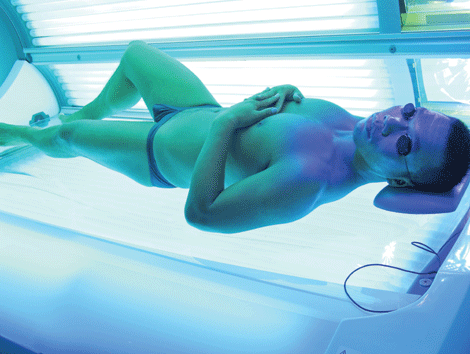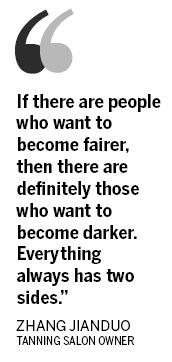Fade to black
Updated: 2011-11-14 07:56
By Tiffany Tan (China Daily)
|
|||||||||
|
|
|
 Zhang Jianduo at his tanning salon. [Jiang Dong / China Daily] |
In a country where white skin is generally seen as beautiful, fake tans are, surprisingly, becoming fashionable. Tiffany Tan reports.
Winter is the season when skin color can take on a pale, grayish hue. Well, most people, anyway. Thirty-year-old Li Xiao's tanning salon visits have lessened since the weather turned cold, and she's had to layer on more clothing, but the beauty regimen remains a regular part of her schedule. It all started in spring with preparations for a sun, sand and surf holiday with friends in the Maldives - which meant being mostly clad in a bikini.
"When you go out on the beach, you don't want to appear like you've never seen the sun before," says the mother of two, who has natural porcelain-white skin, like most Chinese northerners. "After we continued tanning on the beach, I thought it looked all right."
To her husband Guo Fei, the darker version of Li looked better than all right. "I think women with dark skin are more beautiful," he says.
Guo, 29, a Beijing native who owns a real estate firm, discovered the world of tanning through magazines and the Internet a couple of years ago. Now, salon touch ups, year-round, are an indispensable part of his grooming routine.
"The more I tan, the more I like it," he says after a 12-minute session at Beijing's Black Golden Tanning Studio, dressed in shorts and neon yellow high-tops to better show off his darker color.
This mindset puzzles some of the couple's elderly relatives.
 |
"My parents - older people - they think being this dark is not good," Li says. "They say, 'Why would you want to tan?' You know, traditional way of thinking."
In a country where beauty is still largely equated with fair skin, Li and Guo are a novelty.
Back in the spring of 2007, people around Zhang Jianduo raised their eyebrows upon hearing that he and a friend had just opened a tanning salon in the Chinese capital. "Why tan? Isn't the point to have whiter skin?" was the most common response he got, Zhang says.
But through the media, he already knew that tanning salons in Shanghai - the country's first - were attracting Chinese clients. Among them were people who had lived in the West and had adopted the idea of tanned skin as beautiful, as well as those who were plain unhappy with their light coloring.
"If there are people who want to become fairer, then there are definitely those who want to become darker. Everything always has two sides," Zhang, 29, says.
His experience also illustrates that doing business in the rapidly evolving Chinese social landscape involves uncommon daring and forward thinking. Zhang's db tanning salon now claims 2,600 clients, 70 percent of them Chinese. This summer, he and his partner opened another branch to cope with rising demand and technological innovation in the industry.
An online search of tanning salons in Beijing shows results for about 10 shops, mostly situated in the central business district. A good number of them opened in the last couple of years.
Yuan Shan, a dermatologist at Beijing United Family Hospitals and Clinics, says the rise of tanning on the mainland can be chiefly attributed to the influence on youngsters of Hong Kong film celebrities, who show off darker skin in their glamorous public appearances.
Another reason, she says, is that tanned skin has become synonymous with money, since rich Chinese often indulge in expensive outdoor sports like golfing and sailing, which leave them with ruddy, glowing skin.
Doctors are not too thrilled with the health effects of constant and prolonged tanning - whether natural or artificial - but they do understand that it's become fashionable.
"We don't like it because of skin cancer, but it's a lifestyle choice," says Yuan, whose subspecialties include cosmetology and laser surgery.
She says people should consult a doctor before embarking on regular tanning sessions, since some people are allergic to ultraviolet rays and tanning lotions, while there are diseases, like hypertension and diabetes, which can be aggravated by prolonged exposure to the sun.
Those who do patronize tanning salons should limit their sessions to one a week, 10 to 15 minutes each time, Yuan says.
Dong An, a 31-year-old media professional who took to tanning as a college student in New Zealand, is aware of the health risks of tanning so he only visits salons between summer and fall, during shorts and sleeveless shirts season.
Some of his male friends, however, go year-round because darker skin emphasizes the muscles they've worked so hard to build in the gym. "They want to look more virile and sexy," Dong says after a 10-minute treatment at Sunkissed Tanning Studio, on Beijing's north side.
Guo Fei shares the same sentiments as Dong's friends. In summer, he gets a salon tan every three to five days, otherwise he'll "feel bad". Now, he and his wife try to maintain their golden hue with a salon visit once a week.












